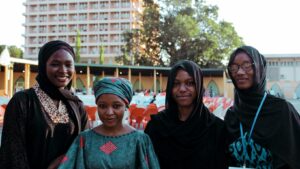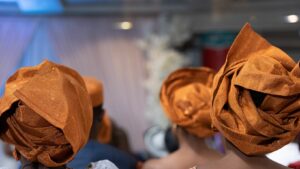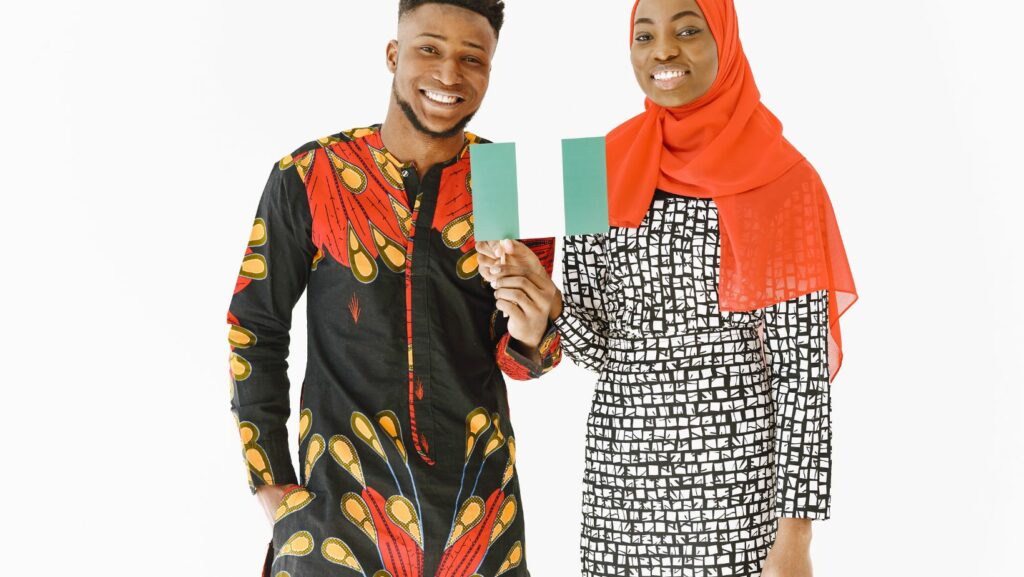 Nigerian fashion showcases a vibrant and diverse cultural tapestry that captivates the global fashion scene. From bold and colorful traditional attire to modern, cutting-edge designs, Nigeria’s fashion landscape is a melting pot of creativity and innovation. Influenced by a rich heritage and a dynamic contemporary aesthetic, Nigerian fashion designers are making waves internationally with their unique and trend-setting creations. With a blend of traditional fabrics, intricate patterns, and avant-garde silhouettes, Nigerian fashion effortlessly merges the past with the present to create a truly distinctive style identity. Whether it’s the elaborate gele headwraps, the flowing agbada robes, or the chic Ankara prints, Nigerian fashion embraces individuality and self-expression in every stitch and seam.
Nigerian fashion showcases a vibrant and diverse cultural tapestry that captivates the global fashion scene. From bold and colorful traditional attire to modern, cutting-edge designs, Nigeria’s fashion landscape is a melting pot of creativity and innovation. Influenced by a rich heritage and a dynamic contemporary aesthetic, Nigerian fashion designers are making waves internationally with their unique and trend-setting creations. With a blend of traditional fabrics, intricate patterns, and avant-garde silhouettes, Nigerian fashion effortlessly merges the past with the present to create a truly distinctive style identity. Whether it’s the elaborate gele headwraps, the flowing agbada robes, or the chic Ankara prints, Nigerian fashion embraces individuality and self-expression in every stitch and seam.
Nigerian Fashion And Style
Traditional Attires Across Different Tribes
Nigerian traditional attire varies across the diverse tribes in the country, each with its unique style and significance. The Yoruba, Igbo, and Hausa-Fulani tribes, among others, showcase rich cultural heritage through their clothing. For instance, the Yoruba traditional attire includes the “Buba” (top) and “Iro” (wrapper) for women, while the men wear the “Agbada” (robe) with a “Fila” (cap). In contrast, the Igbo traditional attire features the “George” wrapper for men and the “Iro and Buba” ensemble for women. The Hausa-Fulani people are known for their elaborate “Babban Riga” (long tunic) and “Zanna” cap. These traditional attires not only reflect the cultural identity of each tribe but also symbolize their values and customs.
Influence of Historical Events on Fashion
Historical events have significantly influenced Nigerian fashion, shaping styles and trends over the years. The colonial era introduced Western clothing styles to Nigeria, blending with traditional attire to create unique fashion statements. The independence movement in the 1960s witnessed a resurgence of indigenous fabrics like Ankara, which became synonymous with Nigerian fashion. Furthermore, events such as festivals, ceremonies, and rites of passage continue to inspire modern designers, infusing traditional elements into contemporary fashion. The fusion of history and culture in Nigerian fashion highlights a dynamic and evolving sartorial landscape that captures the essence of the nation’s rich heritage.
Key Elements of Nigerian Fashion
Fabrics and Materials
Nigerian fashion is renowned for its diverse range of fabrics and materials that play a pivotal role in defining the country’s unique style landscape. From the rich and colorful Ankara fabric to the luxurious Aso Oke cloth, each material holds cultural significance and embodies a rich history passed down through generations. Designers in Nigeria skillfully incorporate these traditional fabrics into their creations, infusing them with a modern twist to create contemporary and stylish pieces that celebrate the country’s heritage.
Popular Patterns and Designs
 The intricate and vibrant patterns of Nigerian fashion reflect the country’s rich cultural tapestry and artistic flair. Geometric shapes, tribal motifs, and bold colors are prominent features in Nigerian designs, adding depth and visual interest to garments and accessories. Whether it’s the iconic Adire tie-dye technique, the eye-catching Kente cloth patterns, or the elaborate Aso Ebi embellishments, Nigerian fashion embraces a multitude of patterns that convey stories of tradition, history, and individuality. Designers skillfully blend these popular patterns with modern aesthetics, offering a unique fusion of past and present in each sartorial creation.
The intricate and vibrant patterns of Nigerian fashion reflect the country’s rich cultural tapestry and artistic flair. Geometric shapes, tribal motifs, and bold colors are prominent features in Nigerian designs, adding depth and visual interest to garments and accessories. Whether it’s the iconic Adire tie-dye technique, the eye-catching Kente cloth patterns, or the elaborate Aso Ebi embellishments, Nigerian fashion embraces a multitude of patterns that convey stories of tradition, history, and individuality. Designers skillfully blend these popular patterns with modern aesthetics, offering a unique fusion of past and present in each sartorial creation.
Modern Nigerian Style
Fusion of Traditional and Contemporary Designs
In modern Nigerian fashion, the fusion of traditional and contemporary designs plays a pivotal role in shaping the country’s unique style landscape. Designers deftly blend traditional fabrics, such as Ankara and Aso Oke, with avant-garde silhouettes to create stylish pieces that appeal to both local and global fashion enthusiasts. This fusion not only celebrates Nigeria’s rich cultural heritage but also showcases the country’s ability to adapt traditional elements to suit modern tastes.
Prominent Nigerian Fashion Designers
 Prominent Nigerian fashion designers have been making waves on the international stage with their innovative and bold creations that embody the essence of Nigerian fashion. Designers like Lisa Folawiyo, known for her vibrant and eclectic designs that feature intricate beading and bold patterns, have gained recognition for their ability to push the boundaries of traditional fashion. Other notable designers include Deola Sagoe, whose elegant and timeless pieces have graced runways worldwide, and Mai Atafo, celebrated for his modern take on traditional Nigerian attire. These designers not only elevate Nigerian fashion to the global stage but also serve as ambassadors for the country’s rich sartorial heritage. By blending traditional craftsmanship with contemporary aesthetics, these fashion visionaries continue to influence and inspire the next generation of Nigerian designers, cementing the country’s reputation as a vibrant and influential force in the world of fashion.
Prominent Nigerian fashion designers have been making waves on the international stage with their innovative and bold creations that embody the essence of Nigerian fashion. Designers like Lisa Folawiyo, known for her vibrant and eclectic designs that feature intricate beading and bold patterns, have gained recognition for their ability to push the boundaries of traditional fashion. Other notable designers include Deola Sagoe, whose elegant and timeless pieces have graced runways worldwide, and Mai Atafo, celebrated for his modern take on traditional Nigerian attire. These designers not only elevate Nigerian fashion to the global stage but also serve as ambassadors for the country’s rich sartorial heritage. By blending traditional craftsmanship with contemporary aesthetics, these fashion visionaries continue to influence and inspire the next generation of Nigerian designers, cementing the country’s reputation as a vibrant and influential force in the world of fashion.

